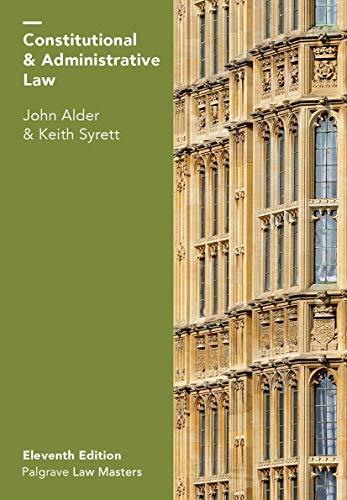Question
Section I. Complete the Sentence. 1. Most crimes today are defined by legislative passage of a ___________ and not the common law. 2. Crimes, in
Section I. Complete the Sentence.
1. Most crimes today are defined by legislative passage of a ___________ and not the common law.
2. Crimes, in general, require: (1) an act or omission and (2) _______________.
3. The requirement that criminal statutes be clear, not vague, and place citizens on reasonable notice of the conduct made criminal is a constitutional one that derives from the ____________ clause of the U.S. Constitution.
4. A criminal conspiracy typically requires an _____________ between two or more persons to commit an unlawful act, or to use unlawful means to achieve an otherwise lawful result, and an act done in furtherance of the conspiracy.
5. The types of criminal statutes that target business executives and financial representatives are commonly referred to as _______-collar crimes.
6. At common law, the crime of bribery, as the act of giving money, property, or any benefit to influence the judgment of a particular person in favor of the giver, was limited to bribes directed to ______________.
7. The crime of ______________ involves threatening someone with bad publicity with the intent to ruin or harm the personal or business reputation of another.
8. Shoplifting is typically a statutory expansion of the common law crime of ____________.
9. The federal crime of ___________ involves buying or selling a publicly-traded stock using confidential information entrusted to you during the course of your employment before it is made public.
10. The federal crime of _____________________ involves the knowing and willful participation in a financial transaction when the transaction is designed to conceal or disguise the source of the funds.
Section II. Short Answer/Critical Thought Section.
A. What must a federal Prosecutor prove in order to successfully prosecute someone for a criminal violation of the Racketeer Influenced and Corrupt Organizations (RICO) Act. Be sure to identify and fully explain each required element and the standard of proof required in general.
B. What are the criminal penalties that may be assessed against a Defendant who is prosecuted successfully under the RICO Act.
C. In a successful civil RICO action, what civil remedies are available to the prevailing party?
Section III. Practical Skills Section.
A. Using Google Scholar, look up the case of U.S. v. McGee using its citation "763 F.3d 304" and type its citation into the search box for "Case law".Read the Opinion, paying careful attention to Sections I, IIA and III of the Opinion and respond to the questions below.
1. Identify the federal Act under which Defendant McGee is charged with "insider trading?"
2. Identify the two complementary theories of insider trading liability that are cited by the Third Circuit in this case and state which of these two theories was used to convict Defendant McGee under.
3. Explain why the Third Circuit Court of Appeals found that there was sufficient evidence to uphold the Defendant's conviction for securities fraud/insider trading, notwithstanding Defendant McGee's contention that he got his trading tips not from a professional or executive but from a fellow Alcoholics Anonymous member?
B. Corporations may have rights by virtue of "morals clauses" inserted in contracts for criminal conduct by those employees. The popular cases involving Matt Lauer, former host of The Today Show, and Tavis Smiley, former show host at PBS, are just two of many such examples.
1. What are "morals clauses" and what do they typically cover?
2. Research the Lauer and Smiley cases and state: (1) whether criminal conduct was involved, and (b) what rights were asserted successfully by their corporate employers.
C. Using either Google Scholar or Westlaw Campus Research, look up the following case entitled Cedric Kushner Promotions, Ltd. v. Don King, 533 U.S. 158 (2001) and answer the following question after reading the U.S. Supreme Court Opinion. Briefly, the Petitioner, Cedric Kushner Promotions, Ltd., is a corporation that promotes boxing matches. Petitioner sued Don King, the president and sole shareholder/owner of Don King Productions, a corporation, claiming that King had conducted the boxing-related affairs of Don King Productions in part through a RICO "pattern," i.e., through the alleged commission of at least two instances of fraud and other RICO predicate crimes. The lower courts dismissed the complaint because, in their view, RICO and its provisions apply only where a plaintiff shows the existence of two separate entities, a "person" and a distinct "enterprise," the affairs of which that "person" improperly conducts.In this case, "it is undisputed that King was an employee" (and sole owner) of the corporation Don King Productions and that King was also "acting within the scope of his authority."
Did the Supreme Court find that Don King violated the RICO Act? Explain why or why not. (5 Points)
Section IV.
Identify and explain three significant differences between the Criminal Law and the Civil Law that involve the parties, the burden of proof and the remedies sought.
Step by Step Solution
There are 3 Steps involved in it
Step: 1

Get Instant Access to Expert-Tailored Solutions
See step-by-step solutions with expert insights and AI powered tools for academic success
Step: 2

Step: 3

Ace Your Homework with AI
Get the answers you need in no time with our AI-driven, step-by-step assistance
Get Started


